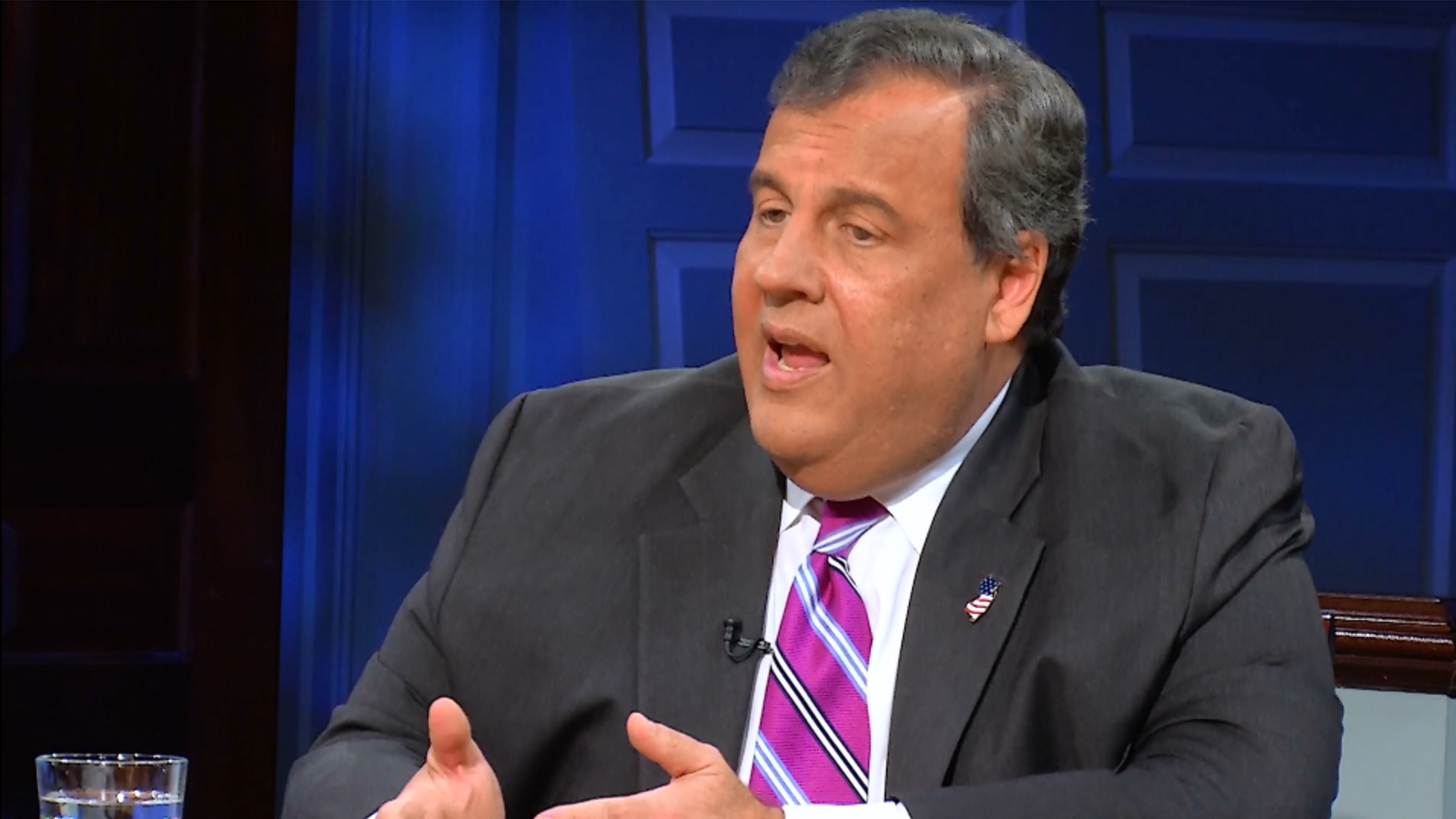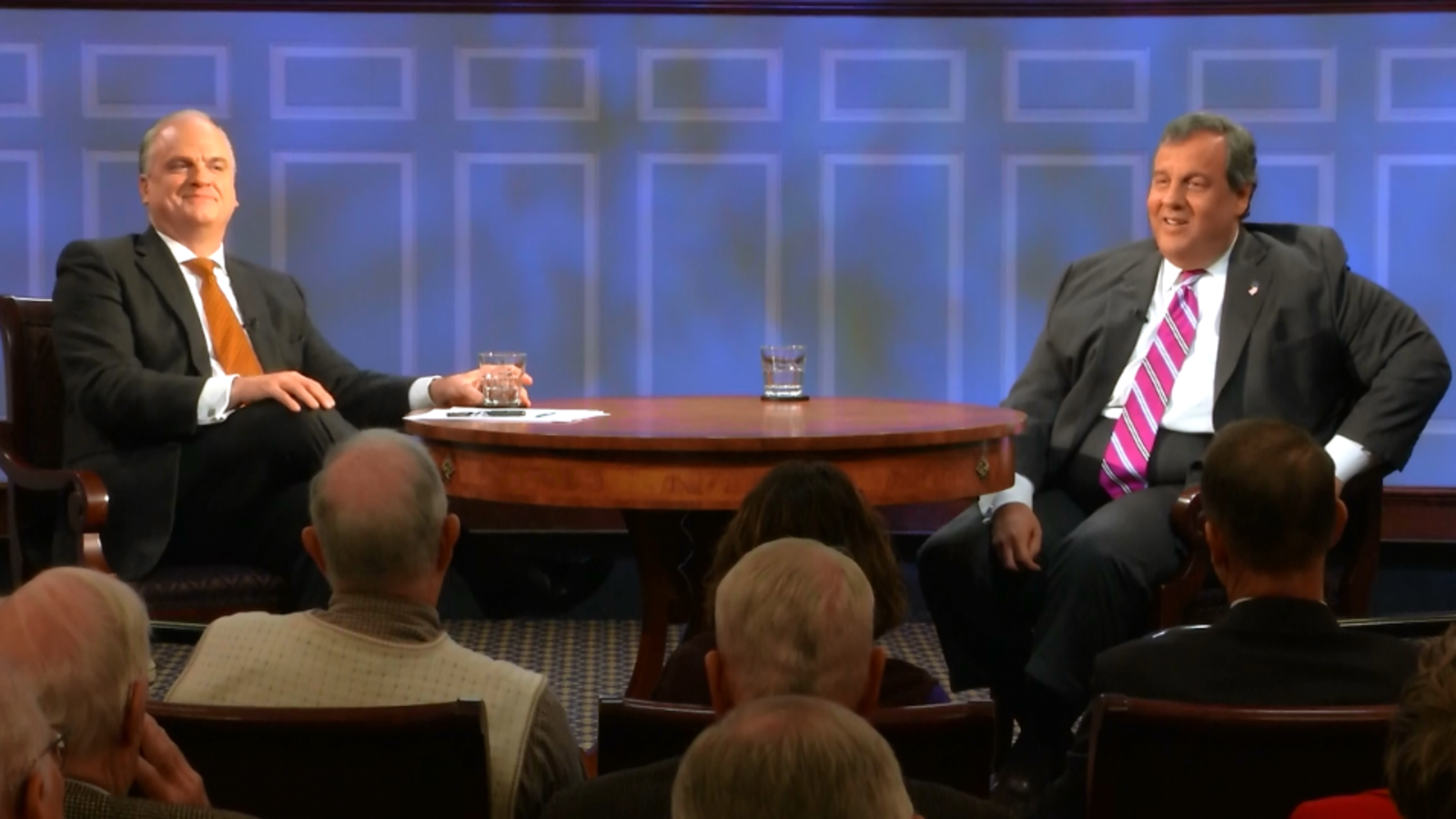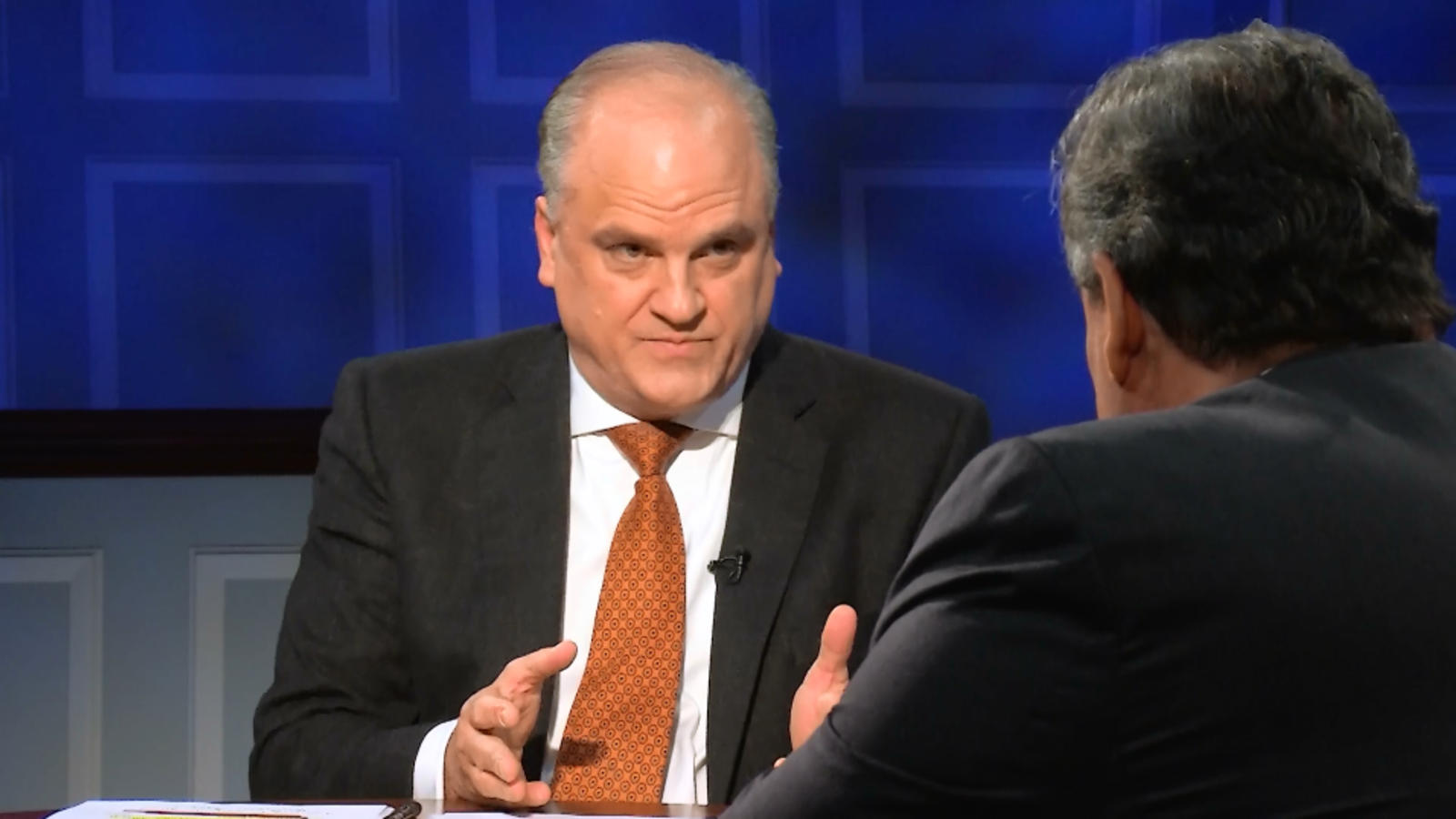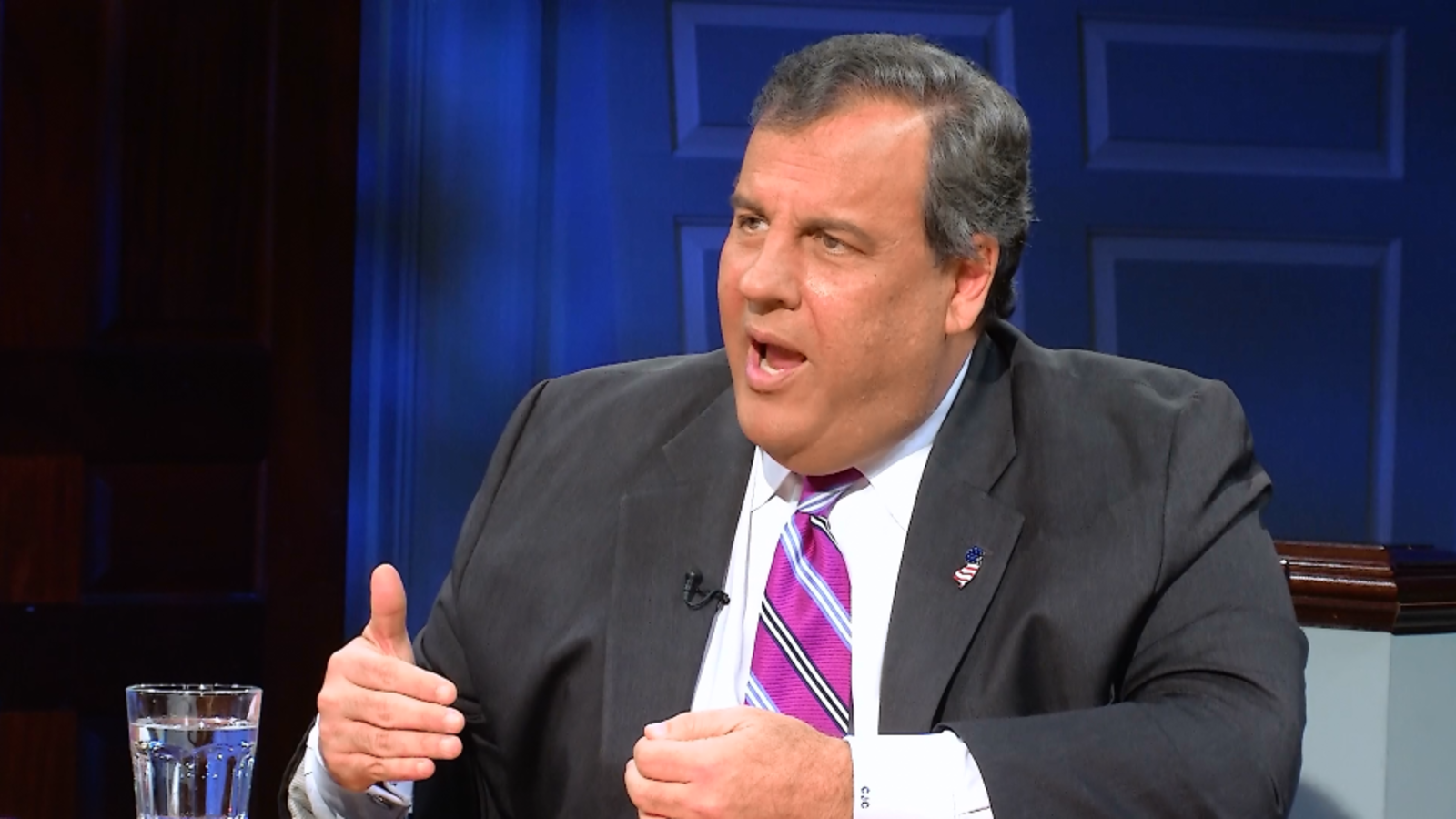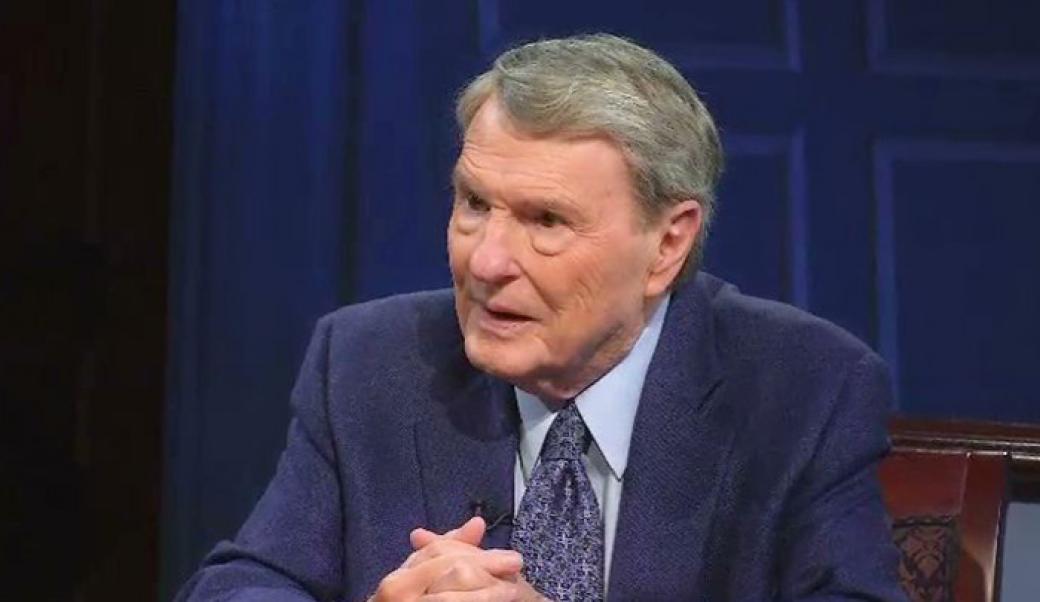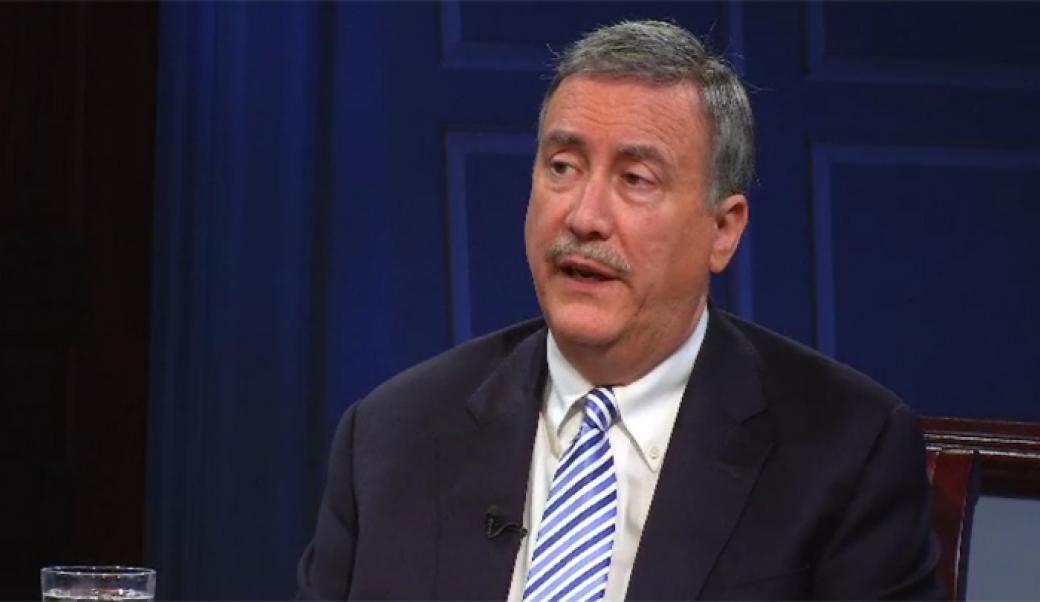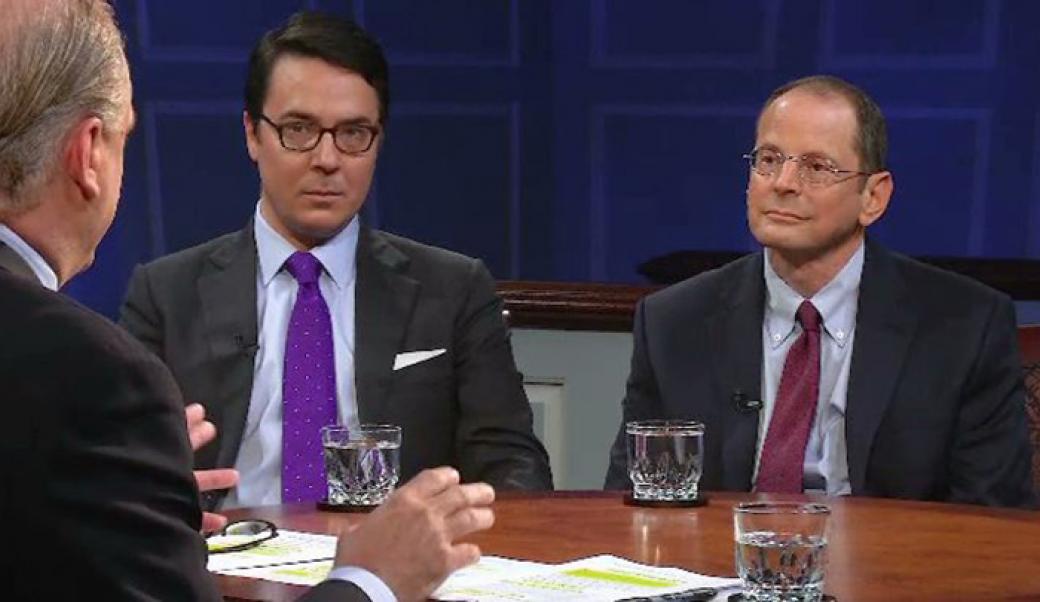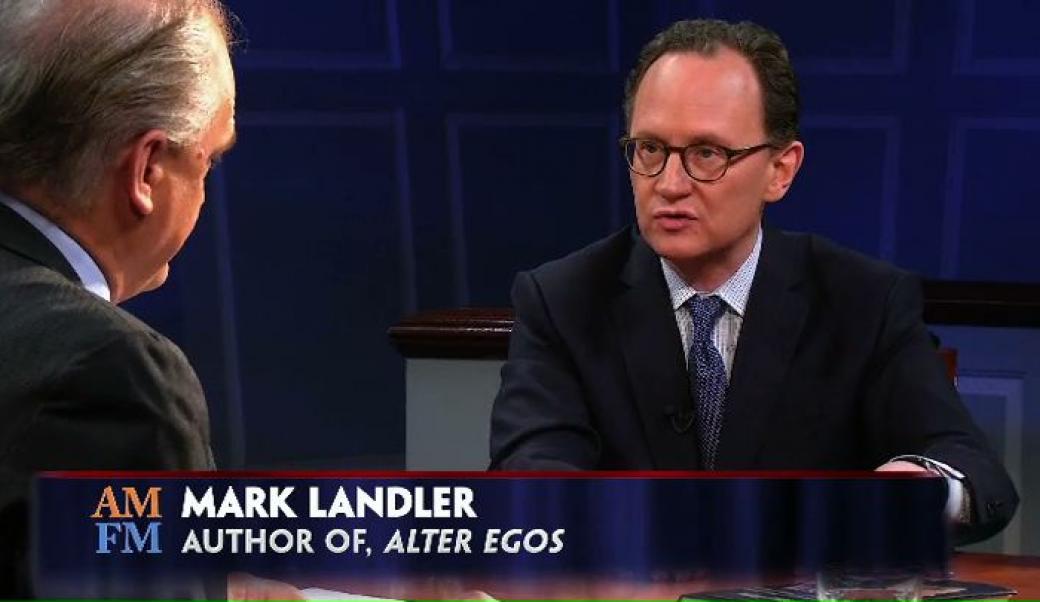About this episode
February 28, 2018
Chris Christie
Hosted by Douglas Blackmon
More than a year into the presidency of Donald Trump, the Republican Party is at a crucial juncture. Party leaders and the president have broken from years of insistence on stringent spending limits and deficit reductions and instead embraced budget increases, tax cuts, and a new brand of economic populism. Is this a temporary deviation for the GOP, or is it the emergence of a profoundly different American conservatism? Few national figures have wrestled more directly with those competing visions than former New Jersey Governor CHRIS CHRISTIE, who made a bid for the Republican presidential nomination in 2016. He joins us for this week’s episode of American Forum.
Transcript
0:42 Douglas Blackmon: Welcome back to American Forum. I’m Doug Blackmon. More than a year into the presidency of Donald Trump, the Republican Party is at a crucial juncture. Party leaders and the president have broken from years of insistence on stringent spending limits and deficit reductions and instead embraced massive new budget increases, huge tax cuts, and a new brand of economic populism. The result, according to government analysts and economists across the political spectrum, will be record-breaking deficits, at least in the short term, with no reductions to the social welfare programs that Republicans have long said urgently needed to be cut. Is this a temporary deviation for the GOP, or is it the emergence of a profoundly different American conservatism? Few national figures have wrestled more directly with those competing visions of the Republican Party than our guest in this episode. Chris Christie just completed two terms as governor of New Jersey and made a bid for the Republican presidential nomination in 2016. During his tenure as governor, Christie persuaded a Democratic-controlled legislature to pass major bipartisan initiatives and initially won wide support from blue-collar workers as well as the affluent. Unemployment fell in the state, and Governor Christie won praise for his efforts to combat New Jersey’s opioid epidemic and for his leadership after the devastating Superstorm Sandy in 2012. After dropping out of a crowded field of GOP presidential contenders last year, he shocked many political observers by endorsing the candidacy of Donald Trump. For a time, he was a top advisor to the Trump campaign and the initial chair of the Trump transition team. After the inauguration, Christie chaired the president’s commission on combating drug addiction and the opioid crisis. Most recently, he joined ABC News as a political contributor. Thank you for joining us.
Chris Christie: Happy to be here.
2:35 Blackmon: So what do you make of that, uh, dichotomy I just laid out of, uh, two visions of the Republican Party? Is that really what’s going on? Is there a struggle for the heart and soul of the Republican Party?
Christie: I don’t know if there’s so much of a struggle right now. I think the president, uh, when you’re president of your party, they tend to write the songbook that people sing out of. And I think the president in his—the beginning of his second year, and so, you know, he’ll have an opportunity, I think, at least through the midterms to be the only person who’s really writing in that songbook.
FACTOID: Trump maintains an 86% approval rating amongst Republicans
And then, once the midterms, you know, flesh themselves out, we may have a change, or we may not, in terms of the way that all works. But I don’t think there’s an active struggle at the moment as much as there is a repositioning of people’s views and opinions as they try to adjust to a relatively new president.
3:22 Blackmon: But—but it does seem that there has been—we had traditional Republicans, uh, I’d say like President Reagan, President Bush, in terms of, uh—big deficits then, too, but still a philosophy of fiscal stringency, a philosophy of internationalism, uh, under President Bush. But then, we come—then we get to the Tea Party era, and then we have a group that is really—doesn’t really care much about those things, cares maniacally about one thing, deficits, really more than anything else. Isn’t there some more fundamental struggle going on over what is conservatism right now?
Christie: I don’t disagree with you that there is a—that there are competing opinions, but I don’t see an active struggle at the moment.
4:00 Blackmon: Ah. He’s just winning.
Christie: That—yeah, that budget passed pretty easily, and—and so, you know, people who had previously—I mean, I thought it was fascinating.
FACTOID: Budget deal will add hundreds of billions of dollars to federal deficit
I heard, um, recently that the—the president’s OMB director—Mick Mulvaney is a former congressman from South Carolina—said he wouldn’t have voted for this budget if he was in Congress, yet he’s the director of the Office of Management and Budget who developed the budget. So that’s kind of interesting to me. I think that kind of tells you what’s going on, that even people like Mick Mulvaney who have a real history, a Tea Party type of history on deficits, etc., he’s now the guy crafting that budget, pushing for it to get through, but at the same time saying, “If I were there, I don’t know if I would have voted for it.” So I don’t see an active struggle, but what I see is some competing political views and philosophical views that won’t be resolved, I think, until we have another election. New Jersey has nearly 800,000 more registered Democrats than Republicans.
FACTOID: In 2016 election, New Jersey voted for Clinton over Trump 55.5%-41.4%
Uh, we haven’t elected a Republican to the United States Senate since 1972. It is the longest streak of any state in the country not to elect a Republican to the U.S. Senate, and so it’s a very blue state. But we were able to do some things over the course of eight years by using the bully pulpit forcefully but then also by being willing to bring people behind closed doors and say, “OK, what do you need for—to make a deal here?” And I think that that was the biggest thing that encouraged me about President Trump, and I—I’ve had a relationship now with him for 16 years, and so I know him very well. I thought he would do that, those things, really well, um, use the bully pulpit effectively but then also be a dealmaker, because that’s been his whole life, is—is making deals behind closed doors. And I think to this point, um, he hasn’t done exactly what I thought he might have.
5:54 Blackmon: Yeah, that second part, that’s where it’s broken down. The—I mean, there is this willingness of him to say, “No, we really need to definitionally change the whole conversation.” He wouldn’t use that word, “definitionally,” but—but that’s what he’s saying, “Um, I’m going to come out here and make this really dramatic claim about a wall at the border that really is a fundamental change in the way that people look at it.” And the initial reaction of all sorts of people, Democrats and Republicans, is, “Well, that’s impossible. That’s so big and different. It’s ridiculously impossible.” But he actually does change where the—the primary thrust of the conversation is in a way that actually is kind of remarkable at times. But then, that second part that you just described, that seems to be where he’s having the greatest struggle and the most failures, of actually doing the deal.
Christie: And I think that’s predominantly because of the people he’s surrounded himself with. Um, you know, his inexperience in politics was seen by the public, I believe, as a positive, that they didn’t want a traditional politician and—and the race of he against Hillary Clinton was the ultimate insider vs. the ultimate outsider, and I think people chose an outsider. But once you get there, you need people around you who know how to play the inside game. That deal-making is the inside game, and I think he’s been—I’ve said this before. I think he’s been ill-served by some of the—by a number of the people around him who haven’t known how to pull that off in this new era. And I think if he gets better people around him, um, he can be very successful at this.
FACTOID: One in three staffers left the White House during Trump’s first year
But as of this point, he hasn’t had the kind of people around him who I think can serve him in that way, because you know, as the principal, you go in as the closer on these things. And closing isn’t easy, but you’ve got to get the ball on the tee first, right, before you can take a swing at it. The staff’s job is to get that ball on the tee and teed up right at the level that the principal wants it to be so that when he or she takes their swing at it, they hit it down the middle of the fairway, to further torture that—that analogy. Um, so that’s what I think should be being done, and it’s not being done.
7:57 Blackmon: So you were a US Attorney, a federal prosecutor. That’s how you—you became a person of some renown in the 2000s during the Bush Administration, uh, 2002 to 2008. Um, so you know—and you prosecuted public officials, right?
Christie: A lot.
Blackmon: You worked for the FBI. You know, you—
Christie: Yeah.
Blackmon: —and that’s a busy, uh, district of, uh—of federal court.
Christie: Yeah.
Blackmon: And the—
Christie: A hundred and thirty-five and oh.
Blackmon: There you go.
Christie: We—in seven years, we prosecuted 135 elected or appointed public officials without a defeat.
Blackmon: Yeah. Well, and that gets to something that I’m curious about, uh, in terms of—that, uh—a few weeks ago, we had sitting at the same table here Sally Yates. When we have the president—and I’m not setting this up to just bang on the president. It’s a serious question. But when we have the president and people around the president declaring that an FBI investigation into Russia-gate or whatever, that this is all just a hoax, that this is just a complete and total hoax, it’s a complete and total political prosecution. Now, in the—what did you say it was, 100 and how many cases?
Christie: A hundred and thirty-five and oh.
Blackmon: Of those 135 elected officials, how many of them said you were coming after them for political reasons?
Christie: Probably a good half.
9:02 Blackmon: Yeah. Uh, and how many of them said you were coming after them for racial reasons? I assume some—
Christie: Probably about a third.
Blackmon: About a third? Yeah. Um, and so this is—
Christie: Yeah, but I won. (laughter)
9:13 Blackmon: Well, yeah. Well, exactly.
Christie: So my view of this always was, Doug, that—that as a prosecutor the proof was in the evidence and your ability to bring a case. And when people would accuse me of political motives in prosecutions, I would answer it always the same way: “Show me where the line has begun to form of the acquitted people who I indicted.” And there’s no line, because there were no acquittals, um, and—and that’s because we were very careful about what we did. We only brought charges against those people who we absolutely believed we could prove a case beyond a reasonable doubt against, and then we went and we did it. And so that’s why I think, you know, and—well, I probably shouldn’t answer because I’m anticipating your question, but I—I do believe that the proof ultimately in all this stuff is in the pudding. The proof in the end will be what will prosecutors bring forward, and there is a very talented, tough, principled prosecutor who’s investigating all of this in Bob Mueller.
FACTOID: Trump: Russia-gate single greatest “witch hunt” in U.S. political history
I worked with him when I was U.S. attorney and he was director of the FBI, um, at the same time, so I have a lot of confidence in him.
10:14 Blackmon: The point I’m getting at is twofold, and you’ve already partly answered one. Uh, that is that is a Bob Mueller—is that a reliable person? Should the people of America accept that Bob Mueller is not engaged in a political prosecution? And two, just this basic idea that—is there something inherently political about seeking a warrant in the course of an investigation like Russia-gate?
Christie: So on Mueller, uh, I’d wrap up with him by saying I absolutely have faith and confidence in Bob from the time that I worked with him and don’t have any reason to be—believe that he would pursue anything for political motive. Now, that being said, that doesn’t mean he’s perfect, right? So some of the people, obviously, he employed in the pursuit of this investigation were flawed, and he should have known that. And it’s your job as the lead prosecutor to vet your own people, so when you have people sending the kind of text messages and emails that they were sending that obviously display a bias—I’m sure if Bob Mueller were here right now and the investigation were all over and everything was wrapped up and he could speak freely, he would say to you, “Man, I wish I hadn’t put those people on the case,” or, “I wish I had known what they were and could have gotten them off sooner.” That doesn’t mean he’s biased.
FACTOID: FBI agent Strzok reassigned after texts criticizing Trump discovered
That’s just a mistake, and you’re allowed a few of those as a prosecutor, not too many, but you’re allowed a few of those. So it doesn’t make me feel differently about Bob Mueller, and I don’t believe he’s a guy who is pursuing this for political reasons.
Now, as to the second part, I think one of the things that’s been very good about his investigation is there hasn’t been any leaking. And I think part of the problem in all of this is when prosecutors get engaged in the issue of leaking things out and letting things get public. Certain things are going to have to be public, but I used to have a rule where I’d say I would not allow a search warrant to be issued on a public person, um, unless I already had the evidence to indict them, because the act of that search warrant for most people is like an accusation of guilt. You know, if I come, and they read in the paper, you know, I’ve searched Doug Blackmon’s house and his office. The FBI is there in the raid jackets, you know. We’re taking the boxes out. No one is going, “I want to give this guy the presumption of innocence,” you know? (laughter) Everyone is going, “Oh, God, Doug Blackmon is guilty of something,” right? I mean, and that’s the way people react, and I think as a prosecutor you have to acknowledge that. And so there’s nothing inherently improper about getting a warrant at all, and, remember, there are all kinds of safeguards that are there. You know, you have to submit papers under oath. An independent, Article III, lifetime-appointed judge in the federal system, whether it’s a regular judge or a FISA judge in the case you referring to, they have to review it, and they have to sign off on it. And many times, if it’s a wiretap, they have to sign off on it on a regular basis, and there are all kinds of things that have to happen. So I would say to people, “Have faith in the system.” It does work, and it’s not perfect, but it’s the best one anyone has ever devised. And I have a great deal of confidence in it. It doesn't mean that people don’t make mistakes and abuse their power, and if we see that someone is doing that we’ve got to hold them to account. People who are defending the FBI right now, that’s great, but, remember, let’s evaluate them on their conduct, not just on reputation. Each case has a different set of agents. Each case has a different bit of conduct involved. Let’s look at it that way and examine it, because there are some bad actors, the same way there are bad lawyers. There are bad doctors. There are bad prosecutors. There are bad gardeners, right, in every profession, so let’s keep an eye on those, because the power that the prosecutor and their agents hold is pretty significant over our liberty, and we want to be careful about it. The current director of the FBI, Chris Wray—and I give this disclaimer: he’s a friend of mine, and he’s been my lawyer, so I have a personal relationship with him and a professional relationship with him, which means that I’m a little biased, but it doesn’t mean I’m wrong.
FACTOID: Wray appointed FBI director after Trump fired Comey in May 2017
This is a guy who really understands the role that the Department of Justice and the FBI play in making sure that our country is seen as a place where—where fairness, uh, and—is respected and liberty is protected. And this is not a guy you’re going to find running to the TV cameras. In fact, I would challenge you since he’s been in office to note a time when he’s been in front of a TV camera except when he’s had to go to Congress to give, you know, legally required briefings to members of Congress. I think you’re going to see a whole different FBI under Chris Wray, and I think the president will wind up really, ultimately, being commended for having, you know, put him in place. Put aside whether you agree with the Comey firing or you don’t. Once that vacancy was there, he picked, I think—and it’s probably one of those areas where Sally and I would agree. He picked about the best person you could have picked, and the country is going to be well served over the next nine and a half years having Chris Wray there.
15:06 Blackmon: Yeah, I think she would agree with you, um, and I asked Yates when she was here, given all of this—a similar sort of conversation—I said, “Well, if this investigation goes all the way through and Bob Mueller comes out and says, ‘Actually, uh, there’s nothing here. We’re done. The indictments that have already occurred the pleas that have already occurred, that’s it. Uh, there’s nothing else there.’” And I said, you know, “Will you live with that? Will you—can you believe—take that at face value?” and she said, “Yes.” She said, “I’ll accept that.” Um, and so I could ask you the same thing in a—in a sense. If Chris Wray and Bob Mueller come out and there’s a conclusion to this, and they are saying, “No, there actually is something very serious here,” I don’t know if I mean the president or somebody else—
Christie: Yeah.
Blackmon: —but you would accept that with a high degree of confidence in the way that that was arrived at based on who they are?
Christie: Based on who they are, yeah. I mean, you know, you’re always going to want to look at, you know, the evidence that’s there, and everyone gets the presumption of innocence. Um, and, you know, I think that’s very important for all of us to remember, but I have great confidence in Bob Mueller. I have even greater confidence in Chris Wray.
16:04 Blackmon: Um, the—one of the things that you did do for the president after his election was you chaired this commission on drug abuse and the opioid epidemic. The president declared that to be a national health crisis. You did lots of work on that in New Jersey. Um, but it’s also the case that your commission operated, came up with a report, made some recommendations, but then not a lot of other stuff seemed to be happening. Is the president for real about that issue? Are for real things going to happen, or is it all just kind of a show?
Christie: No, I think it will for a few reasons. One, we made—between the two reports, the interim report and the final report, we made 64 recommendations. The president has now accepted all 64 recommendations. That didn’t get a lot of coverage, but he issued a document saying he accepts all 64 recommendations. That’s important. Secondly, he’s already granted Medicaid waivers to every state that’s asked for it to allow Medicaid to cover drug treatment for the indigent in their states. That is going to open up thousands of treatment beds across the country, and that’s already happened. Um, and now, in this budget that is being submitted, they’re adding another $6 billion for opioid treatment across the country. That’s going to make a big difference. Um, I do think that the president personally cares about this. I know he does. You know, he had a brother who died of alcoholism.
FACTOID: Trump’s older brother, Fred Jr., died in 1981 at the age of 43
He’s now started to talk a little about that publicly. He didn’t really like talking about it. I was one of the people who was urging him to talk about it because I think one of the biggest reasons we have this problem is the stigma that’s still attached to, um, drug and alcohol abuse in this country. And the—the key to that is—and I’ve used this analogy a number of times. My mother was an addict. My mother was addicted to nicotine. My mother was a smoker from the time she was 16 years old, and inevitably, it seemed, at 71 years old was diagnosed with lung cancer. When she was, nobody came to me when they heard the news and said, “Well, Chris, she’s an addict. She’s getting what she deserves. Let her die because, you know what, she knew what she was doing to herself. She did it willingly.” Now, people came to us and said, “Here are some doctors that we—some treatments that have been had. We’re praying for her.” They came to visit her. They spoke to her. And, by the way, I wasn’t ashamed to say to you or anybody else, “My mother has lung cancer. She’s a smoker.” What if my mother was a heroin addict? Would I have said it? Probably not. And if my mother was a heroin addict, would people have reacted in the same way to her? “Let’s go and see her. Let’s help her. Let’s understand this is an illness.”
We need to move this country in the direction of understanding that drug addiction is an illness. It is an illness that can be treated, and we have to treat it. We’re ignoring it now, and people are dying. A 175 people die a day in this country, every day, from opioid overdose, 175 a day. We have a 9/11 every two and a half weeks.
I think the president understands that because here is this guy who has—obviously, whatever you want to say about Donald Trump, he’s got a great opinion of himself, right? Um, I think that’s fairly, fairly safe ground to tread on, right? Um, I’ve sat in dozens of dinners with him. Believe me, he thinks very well of himself. (laughter) He had a brother, his older brother, who was an alcoholic and couldn’t stop and died as a result of it at a very young age. He watched that happen. As a result, I’ve never seen the president take a drink ever, 16 years. I’ve never seen him take a drink, and he’s told me he never has because his brother at the time said to him, “Don’t start. And this—this is going to continue to kill people unless we finally stand up and say, “There’s a way to treat them. Let’s treat them like we treat people with cancer,” which, by the way, in my mother’s case is caused by her own conduct, “diabetes, heart disease.” There’s a genetic element to this, but with some people it’s just caused by their conduct, yet we don’t say, “Don’t treat the guy with heart disease because, you know, he eats bacon eight times—eight times a week.” You know, we—we don’t say, “Don’t treat the person with diabetes because they drink too much sugared soda,” or whatever. But yet, with this, we do. We’ve got to change that.
20:24 Blackmon: But in the ‘90s and the early 2000s, we said to the people who were getting addicted to crack cocaine and who were overwhelming African American and in urban areas—with them, we—we didn’t say, “Let’s give them treatment.” We said, “Let’s pass more and more draconian laws. Let’s put them in prison.”
Christie: Yeah.
Blackmon: “Let’s punish.” And there are some who would say when the president says—or anybody, this is—this is about America, not really about Donald Trump.
Christie: Yeah.
Blackmon: Uh, but that anybody who says, “Oh, this is a national health crisis,” and it overwhelmingly or at least substantially involves white people, but the crack cocaine epidemic, which substantially involved African American people, was a crime epidemic and not a national health crisis, do you think about that contradiction?
FACTOID: 1986 drug law enacted mandatory minimum sentences for coke users’’Christie: Yeah, we were wrong. Newsflash, we were wrong. That’s why in New Jersey we’ve done bail reform now where—where—and New Jersey, believe this, from a—from a criminal justice reform organization is the only state in America that got an A on criminal justice reform. And what we’ve done is we’ve said people who commit nonviolent crimes, we’re no longer sending them to jail when they involve drugs. They go to mandatory rehabilitation, mandatory drug rehab now in New Jersey. We’ve got to change our system. We are not going to jail our way out of this problem, and that view in the ’90s, which was—and it’s—it’s why I think it’s such a big issue, because it’s bipartisan. Remember, in the ’90s, the people who did all of this was the Clinton Administration. He’s the guy who upped all those—Joe Biden was the sponsor of the act that upped all the mandatory minimums and put 100,000 new cops on the street and all the rest of it. It was what we thought at the time culturally was the way to solve the problem. I don’t think we were trying to be racist. I think we were saying, “We’ve got this enormous problem. We think this is the way to fix it.” What we should have learned over the last 25 years is we were wrong. We can’t jail our way out of this problem, and this is from a Republican former prosecutor who had no hesitation sending lots of people to jail, but on that piece we’re wrong. The dealers who make money off this, we should always have a jail cell for them, and there should be a special place in hell for those people who are profiting off of other people’s misery, not just drug dealers on the streets but the drug dealers in the pharmaceutical companies as well, a special place in hell for those folks.
But the victims, the addicts, we’d better start treating them. If you’re really pro-life, you’ve got to be pro-life for the whole life, not just for the nine months in the womb. I’d argue that the nine months in the womb—of course, this comes from a man’s perspective, but the nine months in the womb is the easiest time. They haven’t done anything to disappoint us yet. (laughter) When they come out, that’s when it starts to get hard to be pro-life. See, I think every life is precious, and that’s why I’m pro-life, and I think every life is an individual gift from God. But that 16-year-old young girl on the Florida county lock-up who’s addicted to heroin and got pinched for shoplifting, her life is an individual gift from God. The 45-year-old lawyer who’s addicted to the pills because he hurt his back and now he can’t operate as a father or a husband or a lawyer, his life is an individual gift from God. And until—and I say to my party all the time, “You can be as tough on crime as you want. I’m as tough on crime as anybody, but we’ve got to be smart, and we have to be compassionate.” And if we believe that every life is precious, and I do, then every life deserves a second chance, and we need to give these people a chance, and we haven’t been as a society. And we’d better get with it, or we’re going to see more and more of our friends dying.
23:55 Blackmon: Chris Christie, thanks for joining us.
Christie: Thanks, Doug. Appreciate it.
Blackmon: What do you think about the destiny of the Republican Party in the distant and not-so-distant future? Will it be Donald Trump’s Republicanism? If so, can that version of American conservatism succeed in an increasingly diverse and urban country? Join the conversation by sharing your thoughts with me via the email on your screen or my Twitter handle, @douglasblackmon. You can follow our guest, @govchristie. A reminder, a week from now your PBS station will broadcast the last ever episode of American Forum. We’ll be joined by acclaimed American historian Will Hitchcock and hope you’ll join us as we go out on a high note with an exploration of the legacy of one of our greatest 20th-century presidents, Dwight D. Eisenhower. This show grew out of a weekly roundtable conversation that started here at the Miller Center more than 40 years ago with a goal of encouraging civil discourse and more informed decision-making by citizens and their leaders. Over the past 10 years, close to 500 of those forums were broadcast on public television. It’s been my great pleasure to host most of the last 250. I hope they’ve been informative in an era of disinformation and provoke constructive dialogue that otherwise wouldn’t have happened. I learned more than I could have imagined possible and became more convinced than ever that the preservation of our democracy lies in the rekindling of Americans’ sense of duty to respect one another, even the people we think are dead wrong. By the way, thank you for the scores of kind emails and tweets that have come in from viewers all over the country over the last few weeks. All of us here have enjoyed the ride with all of you. So whether you think I’m dead wrong or right on, come back next week for one last conversation on American Forum. I’m Doug Blackmon. See you next week. (applause)
